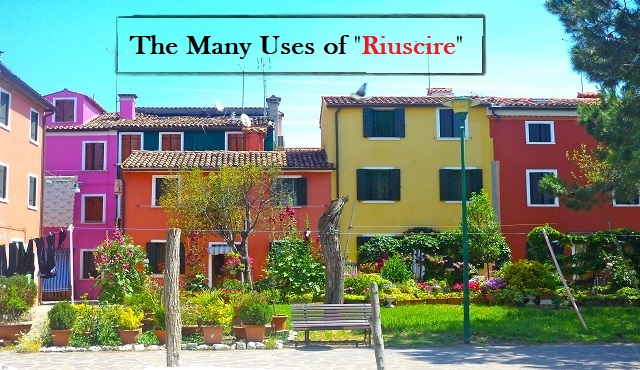The Italian verb riuscire has a wide range of meanings and its use lends a bit of sophistication to one’s Italian phrases. It’s important to learn the nuances of the verb to create sentences as we would in our native language.
When linked by the conjunction a to another verb, riuscire means “to be able to” or “to manage to.” The meaning is similar to potere, with an important exception: riuscire lends a dimension of personal effort on the speaker’s part. Hence the translation into English as “to manage to.” In the negative sense, the use of riuscire a implies that despite maximal work beforehand, it was not possible to make something happen.
In short, the use of riuscire is in a way more sophisticated than the use of potere. Potere is used to make a simple statement about whether something is possible, without stating if the issue is under one’s control or not. There is no reason given or backstory implied with the verb potere. Specifically, with potere, there is no reference as to the ability of a person to make something happen. Riuscire is commonly used in Italy, even by children, when they want to include a personal emphasis in their statement.
Riuscire a can also mean “to turn out” or “to come out.” When something has turned out well, the verb risuscire is commonly followed by the phrase “alla perfezione.”
When riuscire is conjugated and followed by [bene + verb], riuscire takes on the meaning of “to be good at” something.
Riuscire can also be used when describing that one is successful at something. In two situations, when riuscire is followed by the adjectives simpatico/antipatico or difficile/facile, the meaning changes again, to: “to seem” or “to come across as.” This is a colloquial use of riuscire.
Finally, riuscire can be used to mean “to succeed” and also as [ri + uscire] to mean “to go out again.”
Let’s talk about how to conjugate riuscire in the present, past, and future tenses before using it in some example sentences. Present tense: riuscire is an irregular -isco verb in the present tense. The present tense conjugation is below:
| io | riesco |
| tu | riesci |
| Lei,lei,lui | riesce |
| noi | riusciamo |
| voi | riuscite |
| loro | riescono |
Past tense: When used in the passato prossimo to describe a single event, essere is the helping verb and the past participle is riuscito. And, of course, remember our usual rule for past participles: if you are female, or your subject is a group of people, make sure to change the past participle riuscito to riuscita, riusciti, or riuscite!
Riuscire is regular in the imperfetto past tense: riuscivo, riuscivi, riusciva, riuscivamo, riuscivate, riuscivano).
Future tense: Riuscire is regular in the future tense (riuscirò, riuscirai, riuscirà, riusciremo, riuscirete, riusciranno).
Finally, an important grammar rule: use indirect object pronouns (le = to her /gli = to him/ gli = to them) with riuscire.
1. Use [riuscire a + action verb] to describe “being able to do” something
- Notice that when linking the verb riuscire with a action verb, the preposition “a” is required.
- Common daily phrases link riuscire a with trovare to describe if one has been able to find something.
- Note that a substitute verb for riuscire a would be potere, which also means “to be able to,” although riuscire a is often used to emphasize one’s efforts beforehand (as described above). Potere, on the other hand, is used to make a simple statements regarding whether something is or is not possible, without taking into account if a situation is under one’s control or not.
| “Ho guardato in tutta la casa. Ma non riesco a trovare il mio telefonino da nessuna parte!” |
| “I’ve looked all over the house. But I can’t find my telephone anywhere!” |
| “Sei riuscito a prendere un appuntamento con il dottore?” |
| “Have you been able to get an appointment with the doctor?” |
2. Use [riuscire a + action verb] to describe “managing to do” something
- Use riuscire a with the meaning of “to manage to do” something, often in the past tense. As in our examples in #1, the use of riuscire emphasizes that the speaker has been struggling beforehand, and is the verb used to communicate that one has or has not “managed to” get something done.
- Riuscire a can also be used with the future tense to emphasize one’s willingness to “manage to” get something done.
- Riuscire a can be used in place of farcela, which means, “to make it,” but can also mean “to manage to” or “to succeed.”
| “Sono riuscito a trovare i documenti necessario per la riunione di domani.” |
| “I managed to find the necessary documents for the meeting tomorrow.” |
| “Sono riuscito a fare la spesa per la cena stasera dopo il lavoro.” |
| “I managed to go grocery shopping for dinner tonight after work.” |
| “Non sono riuscito a parlare con Maria alla festa ieri; lei era molto occupata.” |
| “I didn’t manage to talk with Maria at the party yesterday; she was very busy.” |
| “Sei riuscito a finire ancora il progetto? È passato già un mese!” |
| “You haven’t managed to finish the project yet? It’s been a month already!” |
| “Ho molto da fare la settimana prossima, ma riuscirò a venire a trovarti!” |
| “I have a lot to do next week, but I will manage to visit you!” |
| “Nostro figlio riuscirà a risparmiare i soldi per una macchina nuova. Anzi, dovrà riuscire; non gli diamo una lira!” |
| “Our son will manage to save money for a new car. Actually, he will have to manage; we will not give him a cent!” |
| “Marco sta male stamattina. Non ce la farà ad andare a scuola oggi.” |
| “Mark is not feeling well this morning. He will not make it to school today.” |
| “Marco sta male stamatina. Non riesce ad andare a scuola oggi.” |
| “Mark does not feel well this morning. He cannot manage to go to school today.” |
3. Use riuscire to describe how something has “turned out.”
| “A mia nonna riesce alla perfezione la pasta al forno ogni volta.” |
| “My grandmother turns out perfect baked pasta every time.” |
| “Molte persone sono riuscite a venire alla la festa ieri sera.” |
| “Many people turned out for the party last night.” |
4. Use [riuscire + bene] to describe if someone is “good at” something
- The verb riuscire is followed directly by bene when using the verb to describe what someone is “good at.” An alternative method would be to use bravo(a) + a to describe that a person is very talented or knowledgeable in their field.
- When using riuscire, the verb that describes exactly what a person’s special talent is can be placed at the end of the sentence in it’s infinitive form.
- Or, the action verb describing what someone is “good at” can start the sentence and riuscire can be placed at the end. With this sentence structure, “a” should be placed before a name, to signify “to + name.” An indirect object pronoun should be placed before the verb riuscire if an individuals’ name is not mentioned.
| “Maria riesce bene a cucinare. Ma lei non riesce bene a far cuocere il pane.” |
| “Maria is good at cooking. But she is not good at baking bread.” |
| “Cucinare a Maria riesce bene. Ma cuocere il pane non le riesce bene.” |
| “Maria is good at cooking. But she is not good at baking bread.” |
5. Use riuscire to describe being successful at something.
| “La mia mostra è riuscita. Ho venduto dieci dipinti!” |
| “My show was a success. I sold ten paintings!” |
| “Giovanni è un bravo atleta; lui riesce in ogni sport che prova.” |
| “John is a talented athlete; he is successful at every sport he tries.” |
6. Use riuscire with the adjectives simpatico/antipatico or difficile/facile colloquially to describe how someone or something “seems” or “comes across.”
| “Maria mi è riuscito simpatico.” “Giorgio mi è riuscito antipatico.” |
| “Mary seems nice to me.” “George comes across as nasty to me.” |
| “Mi riesce facile immaginare di vivere in Italia.” “Mi riesce difficile immaginare di vivere senza te.” |
| “It seems easy for me to imagine living in Italy.” “It seems difficult for me to imagine living without you.” |
7. Use the riuscire to describe “going out” again.
- There are many Italian verbs that begin with “ri” to signify repetition of an action. Of note: ripetere means to repeat.
- Ri + uscire can mean “to go out again.” Therefore, the words “di nuovo” or “ancora” are not necessary.
- Riuscire is not used in the sense of “going out” on a date, which instead in Italian is simply, “Ho un appuntamento con…” for “I have an appointment/date with…”
| “Devo riuscire di casa per sprigare commissioni.” |
| “I have to go out of the house again to run errands.” |
| “Sono appena tornato da fare la spesa ma ho dimenticato il vino per cena stasera. Devo risucire e comprarlo subito!” |
| “I just returned from grocery shopping but forgot the wine for dinner tonight. I have to go out again and buy it right away!” |
Remember how to use the Italian verb riuscire in conversation and I guarantee you will use this verb every day!
 Fra Noi Embrace Your Inner Italian
Fra Noi Embrace Your Inner Italian








I have tried to get my head around riuscire so many times and it always seems to slip out of my grasp. This is by far the best description of its usage and subtleties that I have ever come across.
Grazie mille Bob for your kind words! Molto gentile! – Kathryn
I agree with Bob!